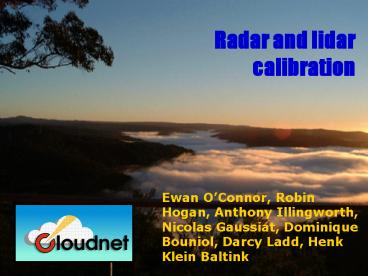Ewan O PowerPoint PPT Presentation
1 / 17
Title: Ewan O
1
Radar and lidar calibration
- Ewan OConnor, Robin Hogan, Anthony Illingworth,
Nicolas Gaussiat, Dominique Bouniol, Darcy Ladd,
Henk Klein Baltink
2
Overview
- Radar calibration
- Typical methods
- Comparison with other wavelengths
- Calibration in rain
- Inter-calibration
- Consistency between cloud radars
- Lidar calibration
- Molecular calibration
- Calibration using liquid water layers
3
Radar calibration by comparison
- Use calibration target of known backscatter
cross-section - Link budget calculation
- Compare to calibrated radar
- At Chilbolton use 3GHz polarimetric scanning
radar - 3GHz calibrated using Z, ZDR, KDP, redundancy in
heavy rain (Goddard et al., 1994) - Correct for gaseous attenuation at 35/94GHz
- Check for Mie scattering, attenuation at 35/94GHz
4
Radar calibration in rain
5
Radar calibration in rain
- Compare observations with theory
Problem apparent bias in observations
6
Radar calibration in rain
- Why bias in observations?
- Additional problem in rain - Radome gets wet
- Causes severe attenuation
- 9 13 dB
7
Radar calibration in rain
- Solution
- Keep radome dry in rain (use cover)
- Observations now agree with theory
- Estimate radome attenuation
8
Radar calibration in rain
- Compare independent methods good agreement
9
Inter-calibration
Cabauw,The Netherlands
SIRTA, Palaiseau (Paris), France
Chilbolton, UK
10
Inter-calibration
- French radar 94 GHz RASTA is mobile
- Solution drive to each site and place radars
next to one another
11
Inter-calibration results
- Add 6dB to RASTA
- 13dB radome attenuation (c.f. 11dB for Galileo)
- Agreement between all 3 radars 1dB
12
Lidar calibration molecular
13
Lidar calibration molecular
14
Lidar calibration liquid layers
- Optically thick liquid layers appear to have
constant integrated backscatter (B) - except when
precipitating
15
Lidar calibration liquid layers
- Calculate theoretical lidar ratio, S
- At 905 nm S is constant for the range of liquid
cloud droplet sizes - Theory says
- B 1/2S
- Calibration method scale observed B (from liquid
water clouds) until equal to theoretical 1/2S - However, additional complication due to multiple
scattering
16
Lidar calibration liquid layers
- Multiple scattering depends on lidar design,
range, and droplet size - Use factor ? to describe effect
- B 1/2?S
- ? variation with range and lidar design can be
calculated (Eloranta 1998) - Calibration within 7
17
Dual wavelength microwave radiometer
- Brightness temperatures -gt Liquid water path
- Improved technique Nicolas Gaussiat
- Use lidar to determine whether clear sky or not
- Adjust coefficients to account for instrument
drift - Removes offset for low LWP
LWP - initial
LWP - lidar corrected

